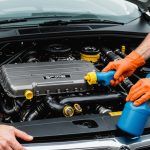Navigating the Legal Process: A Comprehensive Guide to Converting Your UK Vehicle from Petrol to Diesel
Understanding the Need for Conversion
If you’ve recently moved to a country like France from the UK, you might be facing the daunting task of converting your vehicle to comply with local regulations. This is particularly true for vehicles with the steering wheel on the right side, as well as those that need to meet specific emission and safety standards. Here, we’ll delve into the intricacies of converting your UK vehicle from petrol to diesel, or simply ensuring it meets the necessary standards for driving in your new location.
The Importance of Type Approval
Before diving into the conversion process, it’s crucial to understand the concept of type approval. Type approval is a certification that ensures your vehicle meets the safety and environmental standards of the country you’re in. For vehicles imported from the UK, a réception à titre isolé (RTI), or individual approval, is often necessary[2].
In the same genre : Which accessories are essential for a road trip in a UK vehicle?
What is Type Approval?
Type approval is a process where your vehicle is inspected and certified to meet the local regulations. This involves a thorough check of the vehicle’s safety features, emissions, and other critical aspects.
Why Do You Need Type Approval?
Type approval is mandatory for registering your vehicle in many countries. Without it, you cannot obtain a local registration plate, and your vehicle may not be insured or allowed on public roads.
Have you seen this : Understanding sdv: the future of autonomous vehicle simulation
Steps to Convert Your Vehicle
Converting a petrol vehicle to diesel is a complex and often impractical process. However, ensuring your vehicle complies with local regulations is essential. Here are the steps you need to follow:
1. Check if Conversion is Necessary
In most cases, converting a petrol engine to a diesel engine is not feasible or cost-effective. Instead, focus on ensuring your vehicle meets the local emission and safety standards.
2. Obtain a Certificate of Conformity
If your vehicle is relatively new, you might be able to obtain a certificate of conformity from the manufacturer. However, for older vehicles or those not listed in the manufacturer’s database, you may need to go through the RTI process[2].
3. Undergo an Individual Approval (RTI)
For vehicles that do not have a certificate of conformity, an RTI is required. This involves presenting your vehicle to the relevant authorities (e.g., DREAL in France) along with necessary documents and undergoing an inspection to ensure compliance with local regulations.
Documents Required for RTI
Here is a detailed list of documents you may need for the RTI process:
- Certificate of Conformity: If available from the manufacturer.
- Vehicle Registration Document: The original registration document from the UK.
- Proof of Ownership: Documents showing you are the rightful owner of the vehicle.
- Technical Inspection Report: A report from an authorized inspection center.
- Attestation of Compliance: An attestation from a certified body indicating that your vehicle meets local safety and emission standards.
- Customs Clearance Certificate: If your vehicle was imported, you’ll need to show customs clearance documents.
Cost and Time Implications
The cost and time required for the RTI process can vary significantly depending on the complexity of the inspection and the need for any modifications.
Cost
- Inspection Fees: These can range from a few hundred to several thousand euros, depending on the type of vehicle and the extent of the inspection.
- Modification Costs: If your vehicle requires modifications to meet local standards, these costs can add up quickly.
- Administrative Fees: Additional fees for processing the paperwork and obtaining the necessary certifications.
Time
- Inspection Time: The inspection itself can take several hours to a few days.
- Processing Time: The time to process the paperwork and obtain the certifications can take several weeks to a few months.
Additional Considerations for Business Use
If you plan to use your vehicle for business purposes, there are additional considerations to keep in mind.
VAT and Leasing
- VAT Reclaim: If you are using your vehicle for business, you may be able to reclaim VAT on the purchase or leasing costs.
- Lease Agreement: Ensure your lease agreement allows for the use of the vehicle in the new country and complies with local regulations.
Fuel and Breakdown Cover
- Fuel Card: Consider using a fuel card that offers competitive rates and is accepted in your new location.
- Breakdown Cover: Ensure you have adequate breakdown cover that includes assistance in your new country.
Example: Converting a Ford Puma
Let’s take the example of a Ford Puma, a popular car in the UK. If you’re moving to France, here are some steps you might need to take:
RTI Process
You would need to present your Ford Puma to the DREAL authorities in France for an RTI. This involves ensuring the vehicle meets French safety and emission standards, which might include modifications such as adjusting the headlights for left-hand driving.
Cost Implications
The cost of the RTI process for a Ford Puma could include inspection fees, potential modification costs, and administrative fees. Here is a rough estimate:
| Cost Component | Estimated Cost |
|---|---|
| Inspection Fees | €500 – €1,000 |
| Modification Costs | €1,000 – €3,000 |
| Administrative Fees | €200 – €500 |
Time Implications
The time required for the RTI process can vary but typically includes:
- Inspection Time: 1-3 days
- Processing Time: 2-6 weeks
Practical Advice and Tips
Here are some practical tips to help you navigate the process smoothly:
Seek Professional Help
- “It’s always best to seek the help of a professional when dealing with complex regulatory processes. They can guide you through the necessary steps and ensure everything is done correctly,” advises a vehicle import specialist.
Plan Ahead
- “Plan ahead and allow plenty of time for the process. Delays can happen, and it’s better to be prepared,” says a car owner who recently went through the RTI process.
Keep Detailed Records
- Keep all your documents and records in order. This will help you during the inspection and processing stages.
Converting your UK vehicle to comply with local regulations in a new country is a complex process that requires careful planning and execution. Understanding the need for type approval, gathering the necessary documents, and being aware of the cost and time implications are crucial steps. Whether you’re using your vehicle for personal or business purposes, ensuring compliance is essential for safe and legal driving.
Table: Comparison of Petrol and Diesel Vehicles
Here is a comparison table highlighting some key differences between petrol and diesel vehicles, which can help you decide if conversion is necessary or if you should opt for a different vehicle:
| Aspect | Petrol Vehicles | Diesel Vehicles |
|---|---|---|
| Fuel Efficiency | Generally lower | Generally higher |
| Emissions | Higher CO2 emissions | Lower CO2 emissions |
| Engine Life | Typically shorter | Typically longer |
| Cost | Lower purchase price | Higher purchase price |
| Performance | Faster acceleration | More torque |
| Maintenance | Lower maintenance cost | Higher maintenance cost |
Quotes and Insights
- “The key to a smooth transition is understanding the local regulations and planning ahead. It’s not just about the vehicle; it’s about ensuring you comply with all the legal requirements,” says a legal expert in vehicle importation.
- “We’ve seen many cases where vehicle owners have overlooked critical steps, leading to delays and additional costs. It’s always better to seek professional help,” advises a vehicle inspection specialist.
By following this comprehensive guide, you’ll be well-equipped to navigate the legal process of converting your UK vehicle to meet the standards of your new location, ensuring a smooth transition and compliance with local regulations.
Resources for Additional Assistance
When it comes to finding resources and expert guidance, the UK offers a wealth of options to those seeking help on various matters.
In terms of governmental resources, the UK provides several official websites and helplines. These platforms are excellent for sourcing reliable information and advice directly from government bodies. For legal and financial topics, check out GOV.UK; it’s a valuable resource. For health-related issues, the NHS website is an excellent place for trustworthy advice.
For those needing professional services, you may consider solicitors for legal guidance or certified accountants for financial advice. The Law Society and the ICAEW (Institute of Chartered Accountants in England and Wales) can help you find qualified professionals in your area. Using these directories ensures you consult only with credentialed experts who follow established standards.
Online forums and communities offer a more personal touch. Platforms such as Mumsnet and Reddit provide spaces where individuals discuss shared experiences. These conversations offer peer support and valuable insights into various life challenges. However, while these platforms are helpful for shared experiences, always verify any advice with a professional when necessary, ensuring you make informed decisions.
Frequently Asked Questions
When considering vehicle conversions, FAQs often arise regarding insurance implications. The short answer is that conversions can impact insurance rates, but this largely depends on the nature of the conversion and the insurance provider’s policies. If modifications enhance performance, insurers might view the vehicle as higher risk, potentially raising premiums. Be sure to thoroughly discuss your specific conversion with your insurance provider to understand all changes to your policy.
A common concern involves how conversions affect vehicle emissions standards. Generally, modifications aimed at reducing emissions must comply with current regulations. If the conversion improves emissions, it could result in a more environmentally-friendly assessment. It is crucial to ensure all changes adhere to regional emissions guidelines to avoid penalties.
Another frequent user inquiry involves the resale value of a converted vehicle. Typically, conversions can both positively and negatively affect resale value. Enhancements like improved fuel efficiency or performance can attract buyers willing to pay a premium. However, less popular or poorly executed modifications might deter potential buyers, consequently lowering market value. Always weigh the potential resale impact before proceeding with a conversion, and consider consulting an appraiser for a more accurate assessment.
Conversion Checklist for Vehicle Owners
Embarking on a vehicle conversion can be an exciting yet challenging journey. Having a detailed checklist can ensure a smooth transition. Begin with conversion preparation, a critical step in the process. Confirm your vehicle’s eligibility for conversion by consulting both the vehicle’s manufacturer’s guidelines and local regulations. Ensure you have the necessary permits to avoid regulatory issues later.
Engage in thorough research about the conversion process, focusing on understanding the technicalities involved. This includes acquiring the tools and materials needed for the job, such as welding equipment or specific conversion kits tailored to your vehicle type. Consult with experienced professionals if necessary, and outline your action items accordingly.
Post-conversion, it’s crucial to conduct a comprehensive inspection. This includes verifying that all the new systems are functioning correctly and that modifications adhere to safety standards.
Record-keeping plays a significant role in this process, as documenting each step ensures you can easily refer back if troubleshooting is needed. Maintain a log of all parts used, adjustments made, and any consultations you undertook. This not only simplifies maintenance but enhances the vehicle’s resale value by providing a clear record of its conversion history.











